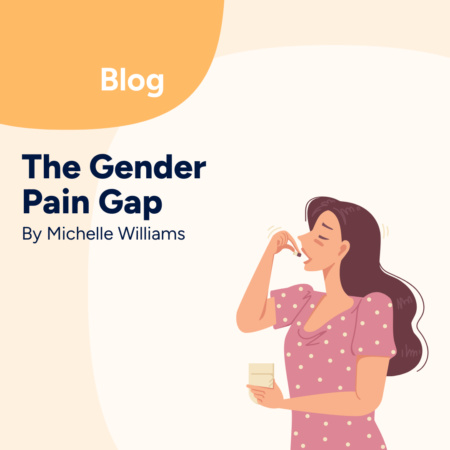The Gender Pain Gap

On International Women’s Day (March 8th) 2021 the government launched a call for evidence to inform the development of England’s first women’s health strategy. They received nearly 100,000 responses from women across the country.
“In a public survey 84% of the respondents said that there had been instances in which they had not been listened to by healthcare professionals. We heard that women had experienced this at every stage of the journey from initial discussion of symptoms, to further appointments, discussions of treatments and follow up care. We heard concerns that women had not been listened to in instances where pain is the main symptom”.1
As women we have long been mistrusted by healthcare professionals as trustworthy reporters of our own symptoms and pain, especially if we have a chronic illness or disability. Three years on from the call for evidence women’s pain is still being treated with scepticism.
With my latest gut issues, I’ve been subject to so much testing to get to the root of what's actually been going on but getting to the testing stage was so hard. No one wanted to listen to me when I was trying to explain the level of pain I was in and how it wasn’t normal. Worse still, I was even saying this is exactly how it felt when my Ulcerative Colitis got really bad just before I had to have my ileostomy. I ended up losing 6 stone this time and a consultant still had the cheek to say to me at that point “the symptoms are all in your head”. I got a third opinion and they confirmed that the symptoms weren’t in my head and nor was the pain, surprise, surprise.
Recent studies2 show that a disproportionate number of women are affected by Gastrointestinal Disorders. This somewhat contributes to the Gender Pain Gap because any sort of gut pain is often passed off as Gynaecological pain by healthcare professionals and something to “just be got on with”.
There is a widely held, often unconscious, gender bias by both male and female healthcare professionals.
A well-known pain medication brand, in the UK, commissioned a specific Gender PAIN Gap report. The first was in 2022 and a second last year, in 2023. Shockingly they found that in just that one year the gap had widened from 7% to 11% and the consequences of that are that women are now experiencing even longer diagnosis times than men, even when reporting the same pain.3
1 in 4 women versus 1 in 6 men felt no one had taken their pain seriously. For this reason, women are far less likely to seek a diagnosis for their pain, whereas men (who we consider less likely to go to the doctor) are in fact more likely to seek diagnosis for pain.
The top 4 reasons British adults believe the Gender Pain Gap exists are:
- Women are expected to naturally suffer pain from periods and childbirth.
- Women are overly emotional.
- Women’s pain is psychological or the result of factors like stress and hormones.
- Women exaggerate for attention.3
Another occasion I was disbelieved about my pain, and again I am sure I am not alone on this, was after a parastomal hernia repair. I came back from the operating theatres on a morphine pump. However this was removed quite quickly after my return to the ward, and I was given ibuprofen and paracetamol, even though I was written up for stronger painkillers. I ended up discharging myself because I could take stronger prescribed painkillers at home than they would give me there. It was a ridiculous thing to do but when you are in that much pain post op, you do mad things rather than advocate for yourself. I ended up back in the hospital within 24 hours.
If you find yourself in a situation where you’re not being believed or listened to about your pain or other symptoms my advice would be to speak up and be persistent. It can be hard to advocate for yourself especially when you’re in pain, but the alternative is more painful. If you have a close relation, partner or friend who you’re comfortable with knowing about your health issues ask if they can attend your appointments with you. Make sure they know the nature of your pain and symptoms so that if you’re unable to express yourself they can help.
Don’t suffer in silence.
1 Department of Health & Social Care, Our Vision for the Women’s Health Strategy for England, 2021.
2 L. Lungaro, A. Constanzini, F. Manza, M. Barbalinardo, D. Gentili, M. Guarino, F. Caputo, G. Zoli, R. De Giorgio and G. Caio, ‘Impact of Female Gender in Inflammatory Bowel Diseases: A Narrative Review’, Journal of Personalised Medicine, vol. 17, no. 13, 2023.
3Nurofen, ‘Gender Pain Gap Index Report Year 2’, 2023.
Share this article:
by Michelle Williams



About the author
My name is Michelle; I live in Kent with my husband and son. I have a permanent ileostomy as a result of Ulcerative Colitis. You can follow me on twitter.



